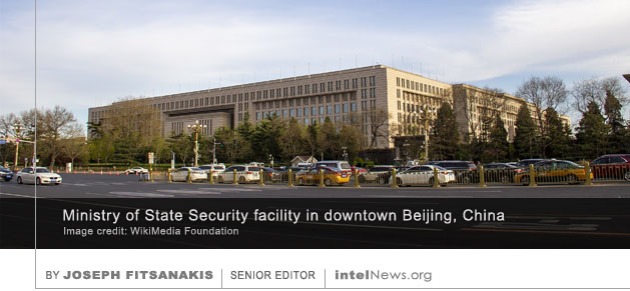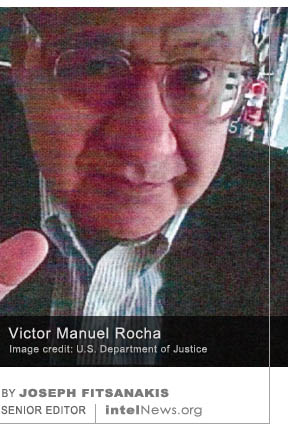Veteran Belgian politician was a spy for Chinese intelligence, report alleges
DECEMBER 18, 2023
 A LONGTIME BELGIAN POLITICIAN worked as a spy for Chinese intelligence for at least three years, according to a joint investigation by a consortium of European news media. Until last week, the politician, Frank Creyelman, 62, was a leading member of Vlaams Belang, a far-right separatist party that draws nearly the entirety of its support from northern Belgium’s Dutch-speaking Flemish regions. In addition to seeking to separate Flanders from Belgium, Vlaams Belang opposes immigration and multiculturalism, with much of its criticism directed at Islam.
A LONGTIME BELGIAN POLITICIAN worked as a spy for Chinese intelligence for at least three years, according to a joint investigation by a consortium of European news media. Until last week, the politician, Frank Creyelman, 62, was a leading member of Vlaams Belang, a far-right separatist party that draws nearly the entirety of its support from northern Belgium’s Dutch-speaking Flemish regions. In addition to seeking to separate Flanders from Belgium, Vlaams Belang opposes immigration and multiculturalism, with much of its criticism directed at Islam.
From 1995 until 2014, Creyelman served as a member of the Flemish Parliament or the Belgian Senate, representing the Antwerp Province. During that time, he became known for his pro-Russian views, which he continued to propagate in retirement. In 2021, he voiced strong skepticism against the Belgian government’s efforts to provide diplomatic, financial, and military support to Ukraine. Following his retirement from frontline politics, Creyelman became an honorary member of the Flemish Parliament. He also remained chairman of Vlaams Belang in his home city of Mechelen, a Dutch-speaking stronghold.
Last week, however, a joint investigation by the British newspaper The Financial Times, French newspaper Le Monde and German newsmagazine Der Spiegel, claimed that Creyelman worked as a spy for China for at least three years. Citing unnamed “intelligence officials from four Western countries”, the investigation claimed that Creyelman had been recruited by Daniel Woo, a case officer for China’s Ministry of State Security. Woo is believed to work out of the MSS branch in China’s far-eastern province of Zhejiang, though he has also served tours in Europe under diplomatic cover, including in Romania and Poland.
It is not known how the MSS recruited Creyelman. It appears that most of his communication with his alleged MSS handler took place via text messages. However, it is claimed that in 2019 Creyelman traveled to Sanya, a popular tourist resort in China’s Hainan Island, where he allegedly met Woo and possibly other MSS operatives. Notably, the journalists behind the investigation into Creyelman claim that they have accessed incriminating messages exchanged between Creyelman and Woo. The text messages span the period between early 2019 and late 2022.
In the text messages, Woo asks Creyelman to try to influence senior-level discussions in Belgium and elsewhere concerning China’s treatment of its ethnic Muslim populations in the Xinjiang Province. The far-right politician was also instructed to find ways to vilify and discredit European researchers and academics who were documenting China’s treatment of ethnic Muslims in Xinjiang. Woo also asked Creyelman to try to quell criticism of China’s crackdown of the pro-democracy movement in Hong Kong. In one message, Woo explained that China’s purpose was “to divide the US-European relationship”.
Last Friday, just hours after the allegations about Creyelman’s alleged espionage emerged, Vlaams Belang announced that it had expelled him from its ranks. In a social media post, the party’s leader, Tom Van Grieken, denounced Creyelman’s espionage as going “against the purpose and essence, even the name, of our party”. He added: “The only loyalty for nationalists can only be to their own nation”.
► Author: Joseph Fitsanakis | Date: 18 December 2023 | Permalink
A senior American diplomat spied for Cuba for 42 years. How serious is this case?
DECEMBER 11, 2023
 LAST WEEK THE UNITED States Department of Justice announced the arrest of Victor Manuel Rocha, 73, a former senior American diplomat, whose career included stints as ambassador and advisor to the National Security Council and the United States Southern Command. Cuban intelligence allegedly recruited Rocha when he was a student in the 1970s and inspired him to spend his entire professional life in search of opportunities to supply intelligence to Cuba —and possibly Russia and China. United States Attorney General Merrick Garland said Rocha’s case was “one of the highest-reaching and longest-lasting infiltrations” of the US government by a foreign agent. This may be an understatement.
LAST WEEK THE UNITED States Department of Justice announced the arrest of Victor Manuel Rocha, 73, a former senior American diplomat, whose career included stints as ambassador and advisor to the National Security Council and the United States Southern Command. Cuban intelligence allegedly recruited Rocha when he was a student in the 1970s and inspired him to spend his entire professional life in search of opportunities to supply intelligence to Cuba —and possibly Russia and China. United States Attorney General Merrick Garland said Rocha’s case was “one of the highest-reaching and longest-lasting infiltrations” of the US government by a foreign agent. This may be an understatement.
A STORIED CAREER IN GOVERNMENT
Rocha was born in Colombia in 1950, but grew up in New York City after his mother emigrated to the United States. In 1965, the studious Rocha earned a full-ride scholarship to a prestigious boarding school in Connecticut. This enabled him to earn an undergraduate degree from Yale University in 1973, before completing master’s degrees in public administration and foreign affairs from Harvard University and Georgetown University.
After receiving his security clearance from the Department of State, Rocha relied on his advanced social skills and native command of the Spanish language to quickly rise through the ranks of the diplomatic corps. Within a decade he had served prestigious assignments in Argentina, Honduras, Italy, Mexico, and the Dominican Republic, where he held the post of deputy chief of mission. In the mid-1990s, Rocha served as deputy  principal officer in the United States Interests Section in Cuba —effectively the second-in-command in Washington’s de facto embassy in Havana.
principal officer in the United States Interests Section in Cuba —effectively the second-in-command in Washington’s de facto embassy in Havana.
Rocha’s diplomatic career culminated with the post of ambassador to Bolivia, from which he abruptly resigned in 2002. He did so reportedly in order to pursue employment in the private sector and raise funds for his children’s college education. Prior to the end of his State Department career, however, Rocha had managed to hold posts as a Latin America adviser to the National Security Council, which is the highest executive decision-making body of the United States government. He had also served as an adviser to the United States Southern Command (USSOUTHCOM), which oversees all activities of the Department of Defense in Central and South America, including the Caribbean.
FORMING REVOLUTIONARY LEFTIST IDEALS
By 1978, when he became a United States citizen, the young Rocha had spent time in Chile. While there, he witnessed first-hand the turbulence of Chilean politics in the lead-up to the military coup of 1973, which cut short the presidency of leftist icon Salvador Allende. Washington’s role in the coup, and in the ensuing junta of General Augusto Pinochet, appears to have steered Rocha’s politics decisively to the left. It was in fact in Chile where, according to the Federal Bureau of Investigation (FBI), Rocha was recruited by the Dirección de Inteligencia (DI, also referred to by its former acronym, DGI). Read more of this post
No comments:
Post a Comment